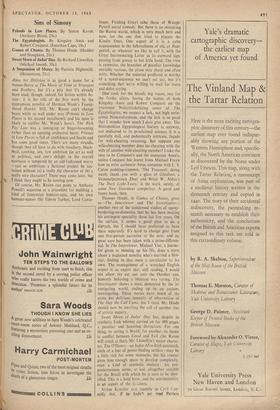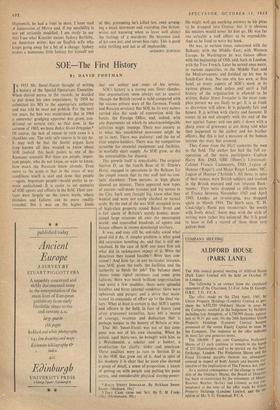Sins of Simony
The Egyptologists. By Kingsley Amis and
and Stoughton, 21s.)
A Suspension of Mercy. By Patricia Highsmith. (Heinemann, 21s.) Alms for Oblivion' is as good a name for a roman-fleuve as The Music of Time or Strangers and Brothers, but it's a pity that it's already been used, though, indeed, for fiction within fic- tion: it is the title of the first work by the eponymous novelist of Herman Wouk's Young- blood Hawke. Still, Mr. Raven can't change boats while so well under way (Friends in Low Places is his second instalment), and his opus is likely to outlive Mr. Wouk's hero's. The Rich Pay Late was a tuning-up or finger-loosening rather than an opening orchestral burst; Friends in Low Places is full of confidence and bustle and has some good tunes. There are many strantls, though they all have to do with treachery, black- mail, conning, sex, raw ambition (in art as well as politics), and one's delight in the overall nastiness is tempered by an old-fashioned worry —can so ambitious a fictional project be sus- tained without (a) a really big character or (b) a really nice character? These may come later, but I think they ought to be coming now.
Of course, Mr. Raven can point to Anthony Powell's sequence as a precedent for building a kind of Jonsonian humour-epic, and his own humour-names (Sir Edwin Turbot, Lord Canta- loupe, Fielding Gray) echo those of Waugh- Powell social comedy. But there is no mistaking the Raven world, which is very much here and now, for the one that tried to placate the Kindly Ones. One aspect of it is a calm acquiescence in the behoveliness of sin, or Real- politik, or whatever we like to call it, with the Great Incriminating Letter as its outward sign, passing from greasy to hot little hand. The view is extensive, the branches of peculiar knowledge enviably various, the prose very sharp and often witty. Whether the material proffered is worthy of a novel-sequence we can't yet say, but it's something that we're willing to wait for more and defer saying.
One cook for the bloody big roasts, two for the frothy afters. Seeing the names of both Kingsley Amis and Robert Conquest on the irreverent Nefertiti-defacing cover of The Egyptologists, we suspect a lark, not high serio- comic Nonconformism, and the lark is so good that 1 wonder how much I dare give away. The Metropolitan Egyptological Society is, anyway, not dedicated to its proclaimed science; it is a carefully dull, and pedantically intricate, facade for wife-cheating swanning. But suppose one wife-cheating member does his cheating with the wife of another wife-cheating member? I take the idea to be Conquest's and the execution Amis's, unless Conquest has learnt from Michael Frayn how to write authentic Amis, complete with L. S. Caton pudding-sixpence. `The Treasurer, doing nicely thank you with a glass of Glenlivet. a Shimmelpenninck Duet and Brian W. Aldiss's The Dark Light-Years,' is the work, surely, of some New Statesman competitor. A good and funny book, then.
Thomas Hinde, in Games of Chance, gives us—The Interviewer and The Investigator— another two of the condensed studies of agony- bordering-orklementia that he has been making his astringent speciality these last few years. On the surface, it seems a good plan to do a diptych, but I should have preferred to have these separately. It's hard to change gear from one first-person narrative to the next, and no great care has been taken with a prose-differen- tial. In The Interviewer, Michael Vint, a journa- list given to messing up his life, does a story about a neglected novelist who's married a film- star, finding in that mess a correlative to his own. The management' of a wretched English winter is so expert that, still reading, I would not allow my cat out into the October sun, honestly believing a 'blizzard was raving. The Investigator shows a man, demented by the in- vestigating world, ending up in an asylum, investigating. These stories have much of the acute but delirious intensity of observation of The Day the Call Came, but I think Mr. Hinde should now be awaiting the call of another line of artistic inquiry.
Sweet Morn of Judas' Day has, despite its synthetic Irish whimsy carried on for 488 pages, a peculiar and haunting distinction. For one thing, its setting is Brazil; for another, its theme is conflict between Good and Evil (the Raven will croak at that). Mr. Llewellyn's major charac- ter, The O'Dancy---an Indio-Afro-Irish patriarch, sixth of a line of power-finding settlers—may be a little rich for some stomachs, but his creator gives him enough space to develop complexity, even a kind of symbolic majesty: his pre- posterousness seems, at last, altogether suitable for the Brazil with which he is seen to be iden- tified. This is a bold book, and the sentimentality is an aspect of the bk !dness.
Arthur Koestler said recently to Cyril Con- nolly that, if he hadn't yet read Patricia Highsmith, he had a treat in store. I have read A Suspension of Mercy and, if my sensibility is not yet seriously modified, I am ready to say that I see what Koestler means. Sydney Bartleby, an American writer, has an English wife who keeps going away for a bit of a change. Sydney makes a humorous little fantasy for himself out
of this, pretending he's killed her, even arrang- ing a mock interment and recording (the fiction- writer not knowing when to leave well alone) the feelings of a murderer. He becomes cock of his own jest, and serves him right. This is good solid thrilling and not at all implausible.
ANTHONY BURGESS







































 Previous page
Previous page